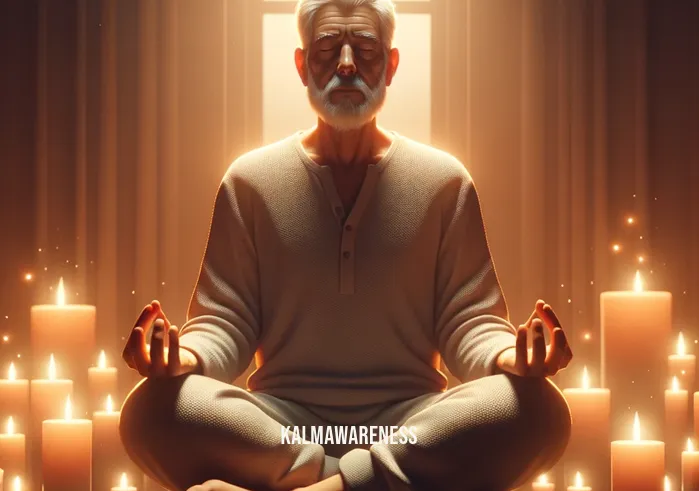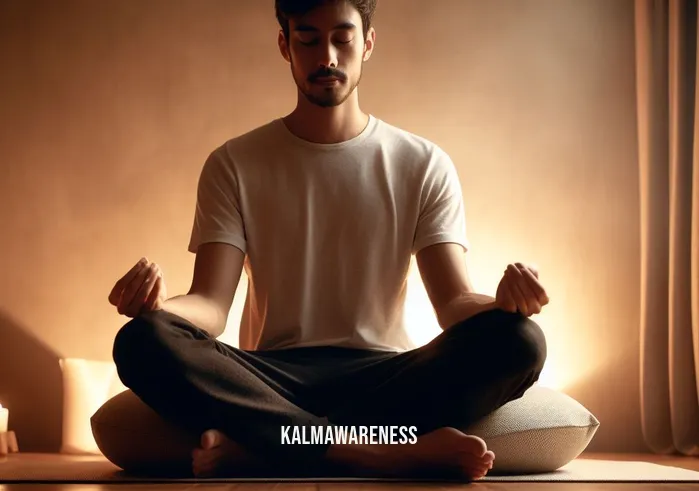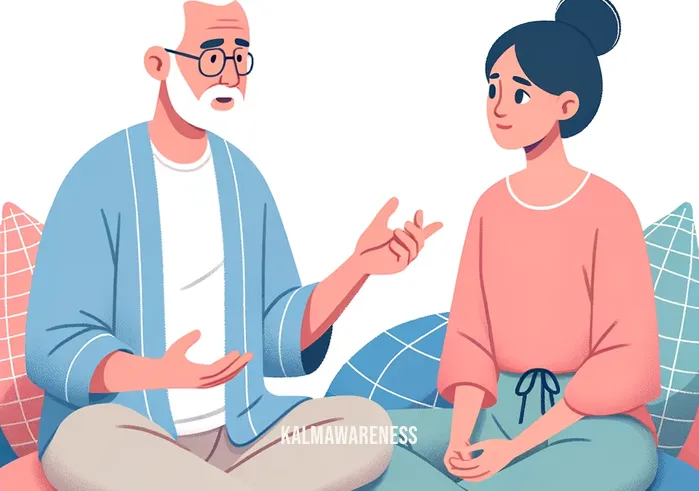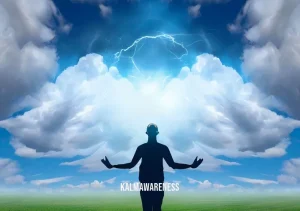Feeling Tired After Meditation: Understanding the Paradox of Relaxation and Energy
Meditation, a powerful tool embraced by many for its holistic benefits, often paints a picture of relaxation, rejuvenation, and a heightened sense of awareness. But what if, instead of feeling invigorated, you find yourself feeling tired after meditation? It seems counterintuitive, doesn’t it? In this comprehensive exploration, we delve into why this phenomenon occurs, ensuring that by the end, you have a robust understanding of the intertwining realms of relaxation, energy, rest, rejuvenation, and recovery in the context of meditation and overall well-being.
The Essence of Meditation
Before delving deeper into the crux of the matter, let’s first establish a foundational understanding of meditation. Meditation, as explored in this comprehensive guide, is about attaining a peaceful state of mind where worries and excessive thoughts cease to dominate. By setting aside dedicated time to focus inwardly, individuals can connect with their true selves and find solace from the chaotic external world.
The Paradox: Energy Vs. Fatigue
There’s a general misconception that all forms of meditation are designed solely for relaxation. However, mindful movement sleep and floating meditation, for instance, aim to revitalize the body and mind, allowing practitioners to tap into latent energy sources. On the other hand, practices such as the EMDR meditation can, occasionally, lead to feelings of fatigue, particularly if one is processing deep-seated emotional trauma.
Similarly, when engaging in techniques that involve heightened frequencies, such as the 111 frequency meditation, individuals might experience a surge in energy, often feeling elated or rejuvenated post-session. But, the very essence of these practices can sometimes be overwhelming, leading to a sense of exhaustion.
Recognizing the Role of Physical Positioning
The position in which you meditate can play a pivotal role in determining your post-meditative state. Traditional postures, like the seated lotus position, can help maintain alertness. In contrast, practices like lying down meditation promote relaxation, making them ideal for those seeking rest and recovery. The key is to find a balance and recognize the needs of your body and mind. After all, there’s no one-size-fits-all solution in the vast world of meditation.
Delving Deeper: External Influences and Meditation
It’s crucial to understand that the state of fatigue post-meditation doesn’t always stem from the practice itself. External factors play a significant role. For instance, meditating after consuming psychoactive substances, as discussed in this article about meditating while high, can result in varied reactions, from profound relaxation to heightened fatigue.
Furthermore, your environment plays a crucial role. Engaging in practices such as the bubble protection meditation in chaotic settings might not offer the intended benefits, possibly leading to feelings of tiredness.
Summing Up: Embrace the Journey, Not Just the Destination
As we’ll explore further in the subsequent segments, feeling tired after meditation, though seemingly paradoxical, is a natural reaction for many. Understanding the intricate dynamics at play can help practitioners modify their approaches, ensuring they reap the myriad benefits this ancient practice offers.
As we unravel this intriguing paradox further in the next segment, you’ll gain insights into optimizing your meditation practices, ensuring you strike a harmonious balance between relaxation and energy. Whether you’re a novice or a seasoned practitioner, the journey ahead promises to be enlightening.
Continue reading to delve deeper into the nuances of meditation, its varied practices, and achieving a harmonious balance between relaxation and rejuvenation.

The Science Behind Feeling Fatigued Post-Meditation
The act of meditation, while deeply rejuvenating for many, can paradoxically lead to feelings of tiredness for others. It’s essential to delve into the underlying factors that contribute to such an outcome. This chapter is dedicated to further understanding the science and reasons behind feeling tired after meditation, presented in a comprehensive manner that combines both structured lists and tabular information.
Possible Reasons: Beyond the Surface
- Physical Factors: Engaging in specific meditation practices can be physically demanding. For instance, practices like mind breaths require concerted effort and deep breathing, which can lead to temporary feelings of tiredness.
- Emotional Release: Some techniques, such as the Archangel Metatron meditation, facilitate profound emotional release, which can be both liberating and draining.
- Depth of Practice: Delving deep into meditative states, especially during sessions focused on galactic chakra alignments, can be intense and lead to subsequent fatigue.
- DNA Activation: Meditations centered around DNA light codes can initiate cellular activations, leading to transient fatigue as the body adjusts.
- External Disturbances: Background noises or interruptions can make it challenging to maintain a calm state, as discussed in the guide on flight rising meditation. Such disturbances can result in mental exhaustion.
Decoding the Fatigue: A Tabular Breakdown
| Type of Meditation | Primary Objective | Potential Fatigue Factor |
|---|---|---|
| DNA Light Codes | Cellular Activation | Energy shifts at a molecular level |
| Archangel Metatron | Emotional Release | Processing profound spiritual experiences |
| Mind Breaths | Controlled Breathing | Physical exertion due to deep breathing |
| Galactic Chakra | Deep Alignment | Intense focus and alignment efforts |
| Flight Rising | Overcoming Disturbances | Mental exhaustion from distractions |
The Silver Lining: Fatigue as a Sign of Progress
It’s crucial to note that feeling tired post-meditation isn’t necessarily negative. Often, this fatigue signifies a significant shift in energy, heralding transformative experiences. For instance, sessions dedicated to the mindfulness prescription for adult ADHD might leave one feeling drained initially. Still, the long-term benefits in attention and focus are well-documented.
Additionally, some sessions designed for relaxation and rejuvenation, like the 15-minute power nap meditation, aim to induce short bouts of restful sleep, leaving one refreshed.
Bridging the Gap: Practical Solutions
To mitigate feelings of tiredness, consider the following:
- Awareness: Understand the objective of your chosen meditation technique. For example, if you’re practicing u-relax moving meditations, be aware of the physical components involved.
- Duration: Modulate the length of your sessions. Beginners might find shorter periods more sustainable initially.
- Environment: Ensure a calm, conducive environment to minimize external disturbances.
- Hydration and Nutrition: Drink plenty of water and maintain a balanced diet to support your body during intense sessions.
Venturing Ahead
Feeling tired after meditation, while perplexing, can be a testament to the depth and authenticity of your practice. Embracing this fatigue and understanding its root can pave the way for more tailored and fulfilling sessions.
As we venture into the next chapter, we’ll explore the myriad techniques available for practitioners and delve deeper into customizing meditation practices to cater to individual needs, ensuring a harmonious balance between exertion and rejuvenation. Continue reading to further enrich your meditation journey.

Illuminating the Path: Finding Hope When Meditation Drains You
When we dive deep into the vast ocean of meditation, there might be times when instead of feeling buoyed, we find ourselves sinking under the weight of tiredness. But like every ebb has its flow, every dip in energy offers an upward curve of inspiration. Here, we journey through the stories and words of those who’ve found hope in the face of post-meditation fatigue, aiming to light our path with their insights.
Embracing the Silence: The Story of Maya
Maya was an avid practitioner of floating meditation. Yet, every time she emerged from her sensory-deprivation tank, she felt drained. However, instead of giving up, she found solace in the words of a fellow practitioner:
“In the depths of fatigue, I discovered the heartbeats of my true self.”
Maya realized that the fatigue was a sign of shedding layers, an indication of emerging raw and authentic. Over time, she started to appreciate the tiredness as a transition to her more genuine self.
A Symphony of Energy: Alex’s Revelation
While dabbling with the 111 frequency meditation, Alex often felt wearied post sessions. But instead of seeing it as an obstacle, he remembered a quote from an ancient meditation guide:
“In every fall of energy, there’s a rise waiting to sing.”
And sing it did! With consistency, Alex began to note that his periods of post-meditation exhaustion were often followed by bursts of creativity and clarity.
Grounding Through Fatigue: Samantha’s Transformation
Samantha’s preferred meditation style was through c-section meditation after her challenging birthing experience. But the tiredness she felt afterward left her feeling defeated until she came across a sage piece of advice:
“The tree’s roots grow deepest in the darkest of nights.”
Using this quote as her mantra, Samantha began to see her fatigue as a grounding force, anchoring her to her experiences and making her roots of resilience run deep.
Seeking Shelter: Mark’s Bubble of Protection
Mark often felt vulnerable and fatigued after his sessions with the bubble protection meditation. An old mentor once told him:
“Sometimes, the greatest strength is in surrendering to rest.”
He internalized these words, allowing himself to rest when needed, and soon found his protective bubble not just shielding him during meditation, but also energizing him afterward.
Navigating the Highs and Lows: Naomi’s Adventure
Naomi, always curious, tried meditating under altered states using the guide on meditating while high. Despite the initial euphoria, she often found herself tired. A fellow meditator shared with her:
“Even the mightiest rivers have their calm stretches.”
This quote reminded Naomi that fluctuations in energy are natural and that each phase has its purpose and beauty.
Gazing Ahead: The Horizon of Possibilities
Our journeys with meditation, as with life, will be dotted with peaks and valleys. As these inspiring stories underscore, post-meditation fatigue isn’t an end but rather a bridge to a new beginning. When we lean into the tiredness and seek its lessons, we discover untapped reservoirs of strength and inspiration.
In our next chapter, we’ll delve into tools and techniques to harness this newfound energy, turning moments of post-meditation fatigue into stepping stones towards holistic well-being. Continue reading to unlock these transformative strategies.

Unraveling the Enigma: The Science and Spirituality of Meditation Fatigue
Post-meditation fatigue can be perplexing. We approach meditation anticipating clarity and rejuvenation, yet sometimes, we find ourselves encased in a cocoon of weariness. But like any mystery, when dissected, it can be understood. Let’s embark on a journey to dissect the intricacies of feeling tired after meditation, using lists and bullet points for a clear, comprehensive understanding.
Biological Perspectives: The Body’s Response
The physicality of our being plays a vital role in our post-meditation state. Let’s break down some key factors:
- Brain Waves Shift – As we meditate, our brain moves from Beta to Alpha waves, leading to relaxation. However, a sudden transition back can cause fatigue. Further reading on the intricacies of this process can be found in this article about mindful movement and sleep.
- Energy Realignment – Meditation often centers on realigning our galactic chakra and energy systems. This realignment, while beneficial, might cause temporary energy dips.
- Breathing Patterns – A deeper, slower breathing rate during meditation increases oxygen, potentially leading to drowsiness. Dive deeper into breath control with insights from mind breaths.
- Physiological Relaxation – As our body relaxes deeply, the sudden jolt back to the ‘awakened’ state post-meditation can manifest as tiredness.
Psychological Explanations: The Mind’s Play
Emotions, memories, and past traumas can significantly influence our post-meditation energy. Here are some notable considerations:
- Emotional Release – Cathartic releases during meditation, especially when practices like EMDR meditation are employed, can be draining.
- Unearthed Memories – Meditation might bring submerged memories to the surface. Confronting these can be emotionally exhausting.
- Mental Resistance – Sometimes, our minds resist stillness. This internal struggle can sap energy.
Spiritual Viewpoints: Soul Insights
From a spiritual perspective, meditation fatigue can be a profound experience. Delving deeper:
- Spiritual Downloads – Receiving DNA light codes or divine information can be overwhelming for the unprepared spirit, leading to tiredness.
- Energetic Cleansing – As we purge negative energies and replace them with positive vibrations, the process can be taxing.
- Higher Realm Communications – Engaging with higher realms, especially with entities like Archangel Metatron, can leave the soul in awe, which can be perceived as fatigue.
Practical Solutions: Combatting Fatigue
Understanding the root cause of post-meditation tiredness can pave the way for solutions. Here are some actionable steps:
- Restorative Naps – A 15-minute power nap post-meditation can rejuvenate the body and mind.
- Awareness Practices – Integrating exercises from relax and be aware can enhance mindfulness and reduce fatigue.
- Grounding Techniques – Post-meditation grounding, like walking on grass, can stabilize energy levels.
- Optimal Meditation Postures – Understanding whether meditating lying down or seated works best for you can mitigate tiredness.
By demystifying the reasons behind post-meditation fatigue, we become empowered to navigate our spiritual journey with informed grace. As we journey forward to our final chapter, we’ll synthesize our learnings to construct a holistic approach to meditation, ensuring it becomes a source of endless energy and enlightenment. Join us in the next segment as we craft our ultimate meditation blueprint.

Reflecting on the Journey: Understanding Meditation’s Slumbering Embrace
As we pause at the end of this enlightening voyage, it’s essential to reflect on the nuanced tapestry we’ve woven around the phenomenon of feeling tired after meditation. From the biological intricacies to the profound spiritual resonances, our journey has been both intricate and enlightening.
The Journey Recapitulated
Let’s journey back through the winding path we’ve tread:
The Biological Blueprint: We’ve explored how our body, particularly our brainwaves and breathing patterns, responds to meditation, causing us to feel wearied post-practice. The mindful movement sleep concept introduced us to the deep synchronization between relaxation and somnolence.
The Mind’s Labyrinth: Emotions, unearthed memories, and mental resistance form the crux of our psychological interaction with meditation. Practices like EMDR meditation were highlighted as potential sources of post-meditation fatigue, emphasizing the need to handle emotional releases with care.
Soulful Sojourns: Our spirit, too, encounters unique experiences in meditation, whether it’s receiving DNA light codes or interacting with higher realms like Archangel Metatron. These profound experiences can be both exhilarating and exhausting.
The Path Forward: Practical solutions, from the simplicity of a 15-minute power nap to the mindfulness practices from relax and be aware, were shared as effective antidotes to meditation-induced fatigue.
The Bright Horizon Ahead
Post-meditation fatigue, though perplexing, isn’t a roadblock but rather a signpost guiding us towards deeper understanding and growth. The phenomenon is a reminder that while meditation is a journey inward, its effects reverberate through our entire being—mind, body, and spirit.
Moreover, the sensation of weariness is not necessarily negative. It’s an invitation—a call to slow down, reflect, and perhaps even embrace a momentary pause. Like the lull after a song or the quiet after a storm, it’s nature’s way of granting us a respite.
Continue the Exploration
Eager to delve deeper into the realms of relaxation and mindfulness? Our magazine is teeming with rich content that will guide you on varied aspects of well-being. Consider revisiting previous chapters for clarity or diving into related topics like floating meditation and frequency for the throat chakra.
A Heartfelt Thank You
To our cherished readers, thank you for accompanying us on this enlightening journey. Your curiosity and eagerness to understand have been the wind beneath our wings. Stay tuned for more explorations, insights, and journeys in the upcoming editions.
Remember, every meditation, every moment of fatigue, and every sigh of relaxation is a step towards a deeper understanding of oneself. Embrace the journey, cherish the pauses, and always move forward with an open heart. Until next time, be well and stay curious.





